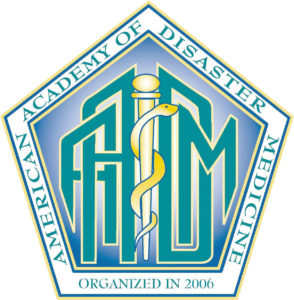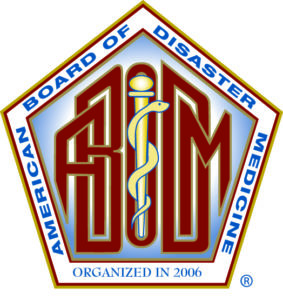September is Disaster Preparedness Month
 September is National Disaster Preparedness Month, and the American Academy of Disaster Medicine® (AADM®) recommends that all households maintain an up-to-date emergency plan. The plan should address preparations for the natural disasters that are most likely to occur in your geographic regions—for example, hurricanes in Florida, earthquakes and wildfires in California. But your plan also should account for potential man-made disasters that can happen anywhere, like chemical spills or factory explosions.
September is National Disaster Preparedness Month, and the American Academy of Disaster Medicine® (AADM®) recommends that all households maintain an up-to-date emergency plan. The plan should address preparations for the natural disasters that are most likely to occur in your geographic regions—for example, hurricanes in Florida, earthquakes and wildfires in California. But your plan also should account for potential man-made disasters that can happen anywhere, like chemical spills or factory explosions.
To help you get prepared during Disaster Preparedness Month, the AADM offers the following emergency planning tips:
- Consider the different safety needs for every kind of potential emergency.
- Locate the nearest disaster emergency centers or shelters in your community.
- Map out an evacuation route.
- Post emergency phone numbers near telephones or program them into your cell phone and keep it handy at all times.
- Prepare a list of family physicians in the event that you or a family member is injured.
- Store all necessary emergency items in easily accessible places, like backpacks or duffel bags.
- Stock up on emergency items such as prescription medicine, eye glasses, drinking water, non-perishable food, a manual can opener, personal hygiene items, extra sets of clothes, and rain gear.
- Select a location near your home as a meeting place, and another place to meet outside your neighborhood in case you and your family members can’t return home after a disaster.
How Physicians Can Protect Their Practice
As a practicing physician, it is essential that you perform an analysis to determine your preparedness for any kind of emergency. To ensure that your office is fully prepared, write a list of potential disasters in your area, and develop a response plan for each. Make a written emergency plan available to your staff so that everyone knows what’s expected of them during a disaster. To limit confusion, assign staff members with specific roles, and even backup roles.
In addition to safely storing business-critical materials, like computer hard drives or cash boxes, you should make arrangements to ensure you can safely access your data from a secondary location, in the event that your practice is compromised. Information you’ll want to have readily available include:
- Updated patient records
- Accounting records
- Vendor contact information
- An updated inventory of your office materials and equipment
Finally, be sure to have your office phone number auto-forwarded to a message that lets callers know the latest information about your practice.
Disaster Medicine Board Certification
 The American Board of Physician Specialties® (ABPS) is the only multi-specialty physician certification body to offer disaster medicine certification and recertification through its Member Board, the American Board of Disaster Medicine® (ABODM®). Our commitment to helping physicians prepare themselves in case of earthquakes, hurricanes, tornadoes, pandemic outbreaks, terrorist attacks, and other natural and manmade disasters led to the creation of the AADM.
The American Board of Physician Specialties® (ABPS) is the only multi-specialty physician certification body to offer disaster medicine certification and recertification through its Member Board, the American Board of Disaster Medicine® (ABODM®). Our commitment to helping physicians prepare themselves in case of earthquakes, hurricanes, tornadoes, pandemic outbreaks, terrorist attacks, and other natural and manmade disasters led to the creation of the AADM.
For information about disaster medicine certification through the ABODM, contact the ABPS today.






